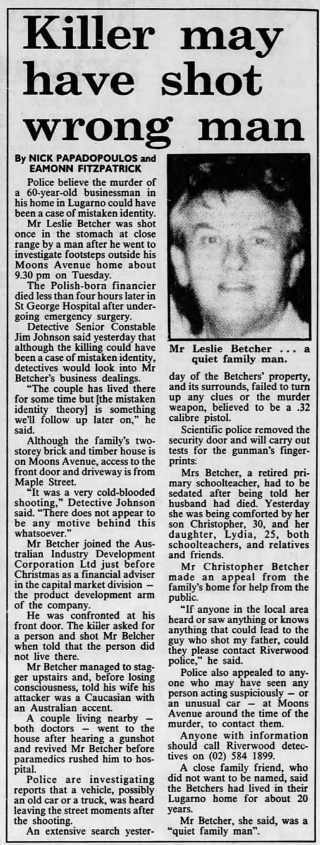30 years ago, I lost my dad. He was at home with mum after a long day at work, when someone came to the front door and shot him. Just like that. He died several hours later in St George hospital from blood loss due to ballistic trauma.
It was an agonising experience for our whole family. We all eventually came to terms with what happened, although I think we all dealt with it in very different ways. Dad was a completely innocent victim in what turned out to be a ghastly case of mistaken identity. To cut a very long story, a hitman by the name of Paul Thomas Crofts had been paid to shoot a underworld gangland figure named Danny Karam, as a warning for some shady stuff he was doing. Of course, there is a whole story behind it and how it came to happen, and the investigations into his murder went on for several years through several court cases and mistrials, but in the end the investigations exposed some pretty big time drug and crime syndicates that were operating around Kings Cross.
Of course, this was not obvious at the start, and it took a long time to work out the details of what happened and who was responsible. And why. We asked why a lot. Those years of not having an explanation for what happened were very difficult for everyone. After it happened, nobody really understood why, and everyone was under suspicion including our own family. As the investigation proceeded, the detectives started to piece together a complex puzzle that eventually led to the truth. There were many layers in the investigation that I won’t go into here, but in the end, getting the full story and being able to put the pieces together and understand what happened was at least some consolation.

At the time, I was 30 and dad was 60. I used to think 60 was old, but now that I’m also 60, I realise just how young 60 really is.
I wanted to note this on my blog today because I worked out that from April 20 1932, the day my dad was born in Lviv Poland, to February 23 1993, the day he died in Sydney, he had been alive for exactly 22,224 days.
Today, December 3, 2023, is 22,224 days since I was born on January 28 1963. Today, I have been alive for the same amount of time that my father was alive. I still feel young. And I’m sure my dad felt young at this age too, but tomorrow I get to wake up and live my 22,225th day, something he did not get the chance to do.
We feel so invincible most of the time, and most of us live as though we have all the time in the world. But life is so fragile. You never know what’s around the corner, be it a serious illness, an unfortunate accident , or some idiot who gets an address wrong and shoots you by mistake. Don’t take life for granted. Spend it doing things you love with people you care about.
Live every day as though it is your last, because one day it will be. And as cliche as that might sound, stop and think how you’re spending your time. How did you spend your day today? Because if you don’t get to wake up tomorrow morning, I truly hope you get to say you spent yesterday living like it was your last.
